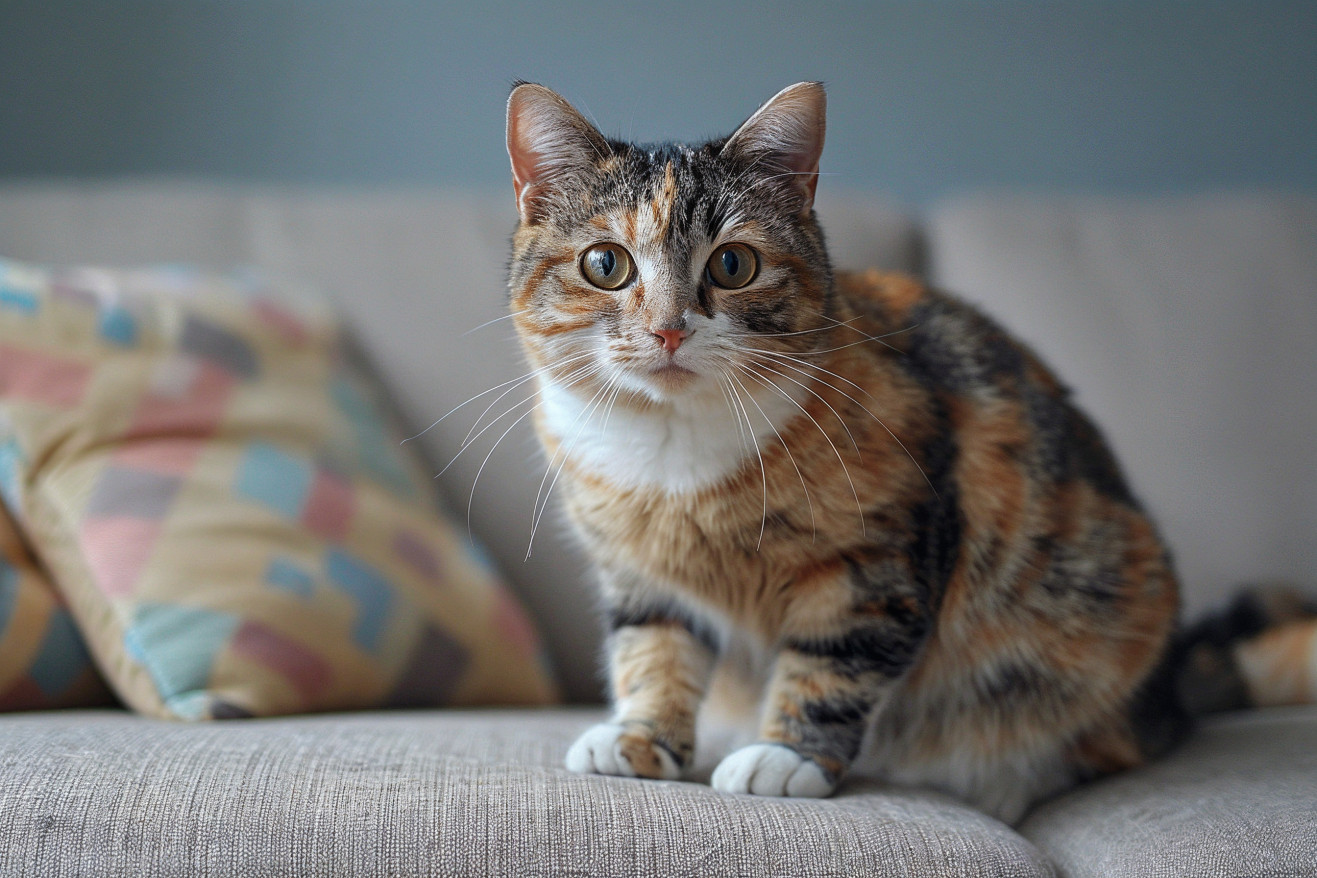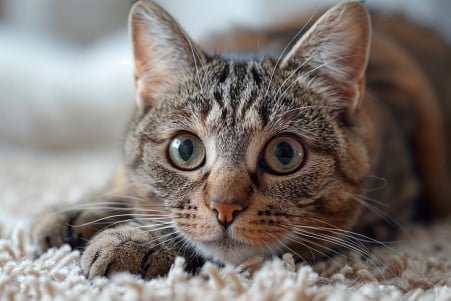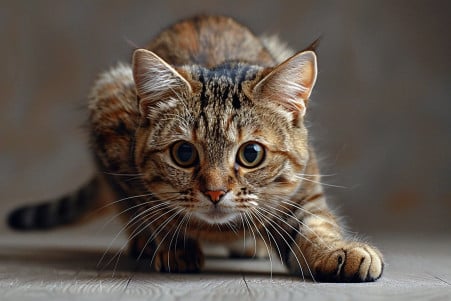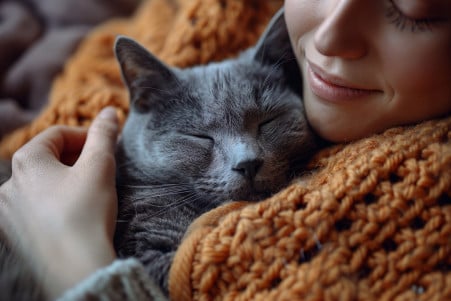Why Do Female Cats Spray? Understanding and Preventing This Behavior
13 June 2024 • Updated 13 June 2024

While it's not as common as it is in male cats, female cats can also spray. Female cats may spray to mark their territory, and this is especially true if they haven't been spayed. Even after a female cat has been spayed, she may continue to spray if she's marking her territory.
This article will delve into evidence-based information from licensed veterinarians, animal behaviorists, and reputable animal organizations to explain when, why, and how female cats spray. This investigation will shed light on the causes, ways to prevent, and potential ways to solve female cat spraying in the home. By learning more about why this happens, you can make sure you're doing everything you can to keep the peace in your home and make sure your cat's needs are being met.
Why do female cats spray?
Hormonal Influences and the Impact of Spaying
Female cats that haven't been spayed are more likely to spray when they are in heat, as it's a way to let male cats know that they are ready to mate with them, according to PetMD. When a cat is spayed, the surgery removes the ovaries and uterus, which means that the hormonal influences that drive territorial marking and mating behaviors like spraying are also removed.
Even though spaying a cat greatly reduces the chances that a cat will spray, some cats that have been spayed will continue to spray due to a learned behavior or other environmental factors. The length of time it takes for a cat that has been spayed to stop spraying can depend on the age at which the cat was spayed, whether the cat was already spraying before it was spayed, and the amount of stress or conflict in the cat's environment.
In general, spaying a cat at a younger age, before the cat starts spraying at around 5-6 months old, is more effective at preventing future spraying. By removing the hormonal drivers before the behavior becomes a habit, spaying can essentially "nip spraying in the bud" for most female cats. However, other factors like territorial marking and environmental stress can still cause the behavior in some cats that have been spayed, which we'll discuss next.
Environmental Stress and Territorial Marking
Female cats may spray urine as a territorial marking behavior in response to environmental stressors. According to the Fetch Pet blog, "Urine spraying in felines is a marking and territorial behavior" and is often a sign that the cat is stressed. Changes in the household, such as new people, pets, or rearranged furniture, can lead to spraying as a way for the cat to mark its territory.
Conflicts between cats, whether in the same household or outdoor cats, can also lead to spraying as a form of communication and marking. The Blue Cross advises that common causes of spraying include "new cats in the home or neighbourhood" as well as other changes like a new baby or person. Providing a secure, stress-free environment with consistent routines and resources can help reduce territorial spraying in female cats.
Using pheromone products like Feliway can also create a calming atmosphere and discourage spraying behavior, according to Best Friends Animal Society. By addressing environmental stressors and promoting a secure, stable home, pet owners can help mitigate territorial spraying in their feline companions.
Other Ways to Stop Spraying in Spayed Females
Making sure that you clean and remove the scent from any areas that have been sprayed is important to prevent future marking, according to How to Stop a Cat from Spraying. In addition, having enough litter boxes (one for each cat in the house, plus one extra) and keeping them clean can also help prevent other types of marking, according to VCA Animal Hospitals.
Environmental enrichment, including scratching posts, toys, and vertical space, can help reduce stress and territorial behaviors, as noted by Feliway. In addition, separating resources (food, water, litter boxes) and creating distinct territories for multiple cats can help reduce conflict and marking, according to The Spruce Pets.
In some cases, medications or supplements prescribed by a vet may be needed to treat underlying anxiety or stress, as VCA Animal Hospitals notes. By following these actionable tips, pet parents can successfully stop spraying in their spayed female cats.
How to Get Rid of Cat Spray Smell
Enzyme-based cleaners, such as Nature's Miracle, are known to be effective at breaking down and eliminating the smell of cat urine, per PetMD. Vinegar, baking soda, and hydrogen peroxide can also be used to neutralize and remove urine odors from a variety of surfaces, according to ServiceMaster of Kalamazoo.
When it comes to carpets and fabrics, PetMD suggests blotting up the urine, rinsing with water, and then applying the cleaner. Meanwhile, hard surfaces may require a combination of spot cleaning with water and an enzymatic cleaner in order to completely get rid of the smell. If you're dealing with a particularly tough or old urine stain and smell, professional carpet cleaning services that specialize in pet odor removal can help, per ServiceMaster of Kalamazoo.
Dealing With Medical Concerns and Seeking Professional Help
In some instances, spraying may be a sign of an underlying medical condition, such as urinary tract infections or feline lower urinary tract disease. Per VCA Animal Hospitals, "Although disease is more frequently associated with inappropriate toileting behavior, presumably due to pollakiuria and stranguria, it may also be associated with urine marking." It is important to consult a veterinarian to make sure that there are no medical issues that are causing the cat to spray.
If you have tried behavioral and environmental changes and they have not worked, Today's Veterinary Practice recommends that you consider working with an animal behaviorist or certified cat behavior consultant. These professionals will work with you to come up with a personalized plan to help you deal with the spraying. It is important to remember that you will need to be patient and stick to the plan that is recommended by the veterinarian or behaviorist.
Conclusion: How to Prevent Female Cat Spraying
Spraying behavior in female cats is a complex issue influenced by various factors, including hormones, stress, and territorial marking. While spaying a female cat can help reduce the likelihood of spraying, it is not a guarantee that the behavior will be eliminated. That said, there are several things you can do to help prevent your female cat from spraying.
These include addressing environmental stressors, providing a secure and enriched living space, and properly managing litter box areas. Patience, consistency, and seeking professional guidance when needed are key to successfully addressing and stopping spraying behavior in female cats. With the right approach and understanding, it is possible to create a harmonious home environment for both you and your feline companion.


